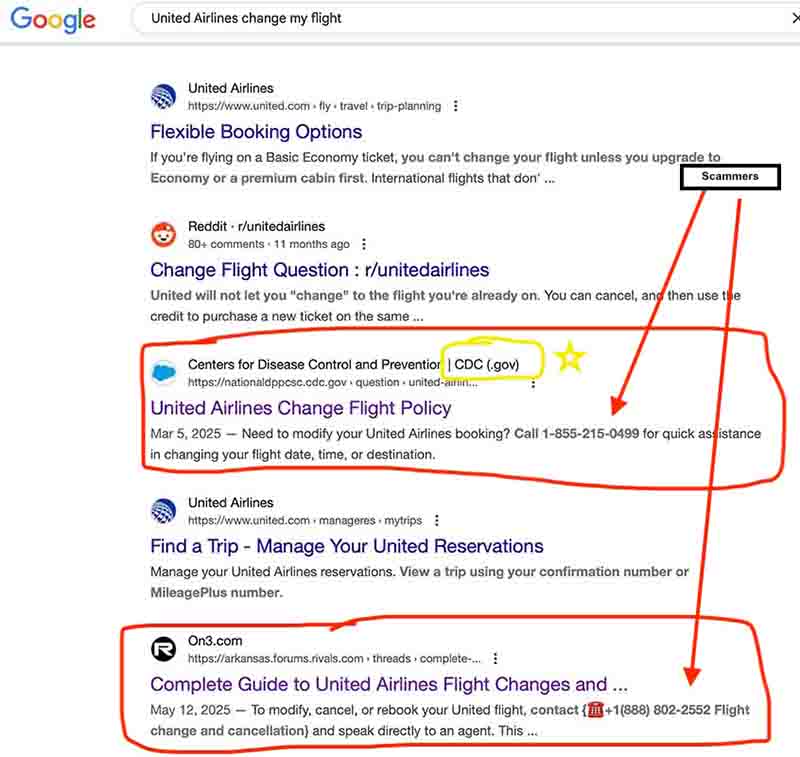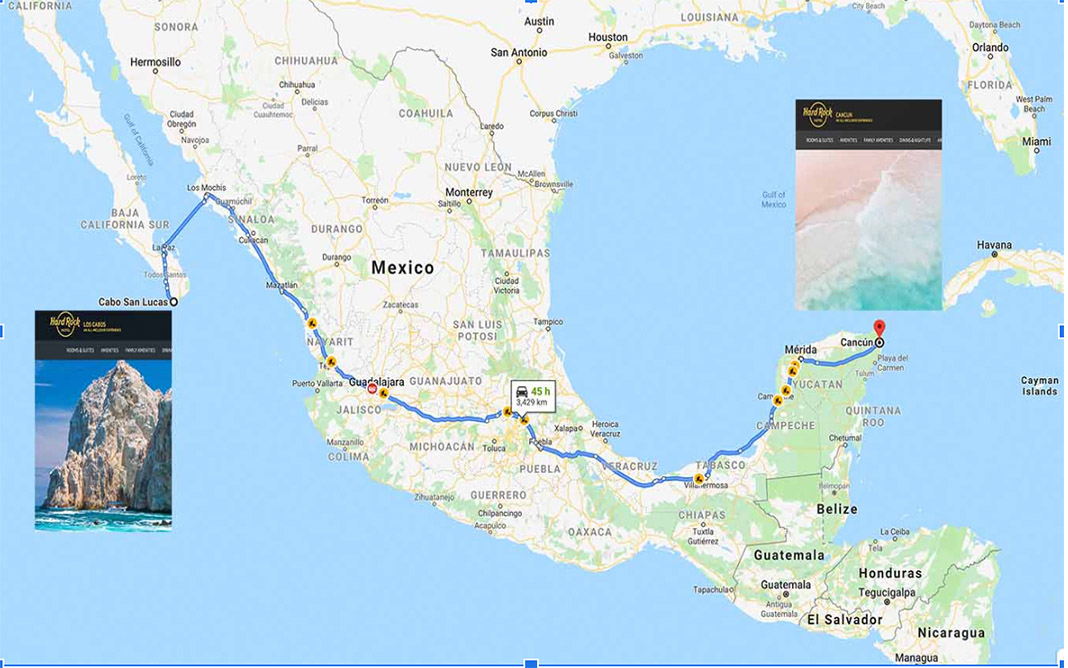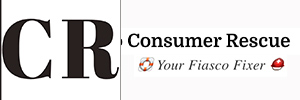Published: Updated:
Expensive, vacation-ruining travel scams are popping up everywhere this summer. Travelers must be on the lookout for predators running money-draining schemes before, during, and even after a trip is complete.
But there is good news.
You can outsmart the bad actors whose only wish is to relieve you of your hard-earned travel dollars. By familiarizing yourself with the latest scams aimed at tourists, you’ll be able to stop the thieves in their tracks.
Here are the top travel scams and schemes to avoid this summer.

1. Scam airline and cruise line call centers
As companies have increasingly relied on artificial intelligence to handle customer service, human scammers have happily filled the void.
Scam call centers have infiltrated the Google search results, posing as official customer service of airlines, cruise lines and more. Travelers with questions or problems, hoping to speak to someone, are easy targets for this type of scam.
Travelers like Christian.
Christian was searching on Google for a dedicated phone number to book a United Airlines business class ticket. Instead of UA, the Google search results directed him to scammers pretending to be the airline. Those con artists booked him the ticket but charged him a $1,750 service fee to do it.
Related: Fake airline call centers, here’s how to protect yourself (My report for Fodor’s)
That exorbitant fee appeared on Christian’s American Express bill as a separate line item charged by “United Airlines.” The scammers had been able to spoof the merchant information in the credit card terminal. After Christian asked Consumer Rescue to advocate on his behalf, Amex reversed the charges, and United Airlines canceled the ticket and rebooked it, eliminating the scammers from the equation.
I wish I could say this scam is an anomaly, but it isn’t. In fact, similar cases have flooded my inbox for the past several years.
Related: Fake British Airways customer service billed me $12,516. Help!
Last year, a Google spokesperson assured me that their teams were working to purge the scam call centers. Unfortunately, even today, the bad guys still seem to be winning the battle in the search results. And the pleas for help from victims of the scam call centers continue to pour in.
Scam call centers remain a problem in the search results
Today (mid-July 2025), I searched for “United Airlines change my flight,” a common customer query. Two of the top five results were scam call centers.
Most disturbingly, the third result was a scam call center being promoted by the Centers for Disease Control, a U.S. government-hosted website.

These results are dangerous for travelers. Many people are in a hurry during their internet searches. They don’t carefully look at the result and assume the number on display is correct. Additionally, they don’t hear the telltale sign of the scam call center when the “agent” answers with a generic greeting of “reservations.”
When I clicked through to the CDC’s website, the page with this information had already been physically removed.
Unfortunately, Google was still showing a snippet from the original page which highlighted the misleading number. It’s easy to see how a traveler could end up calling the scammers. United Airlines doesn’t have a number on display but the CDC does. And, of course, that government-provided information must be reliable, right?
Wrong.
For the travelers who call these numbers, correcting the problem is often a long and challenging road. Not only do the scammers charge hefty “service fees,” but they also steal their victims’ documentation to share with their comrades. Identity theft is often the ultimate goal.
How travelers can avoid the fake call center scam:
- Slow down when searching for a company’s phone number or other contact information. Online predators rely on taking advantage of you quickly before you figure out what’s happening.
- Just because you see a number on display in Google doesn’t mean you should call it. Prior to calling any phone number you see in the search results, even if it is displayed on a highly reputable website like the CDC, look at the organization promoting it. If the website you see isn’t known for being a source of contact information for travelers, it’s likely just a scammer’s bait.
- It’s always best to use the official website of the airline, cruise line or any other business you’re trying to reach. Carefully review the URL at the top of your computer screen to be certain you are, in fact, on the official website. Another safe place to get a reliable number to call is via the official app of the company.
- If you have fallen for a scam call center, enroll in an identity theft monitoring program. Many credit card companies offer this service free or for a small monthly charge.
2. Gift card scams for discounted car rentals, hotels, airfare and more
If your travels include a car rental this summer, you need to be aware of the gift card discount scam.
Similar to the fake airline call center scam, this scheme involves swindlers who place advertisements on the internet for discounted car rentals. These ads appear to be promoting legitimate summer sales from your favorite car rental companies.
Searching the internet for “Hertz discounts” or “Enterprise deals” may lead you straight to a scammer who is eager to take your call. He or she will have big rental car discounts… if you are willing to pay with gift cards.

That is precisely what happened to Mary L., who, at the last minute, decided to rent a car in London during a brief stop over. A bit jet-lagged after her overnight flight from the U.S. but keen to explore the countryside, Mary searched for “Hertz deals.” She called a number that was on display in the results and was soon chatting with a friendly agent.
Not only was the discount the Hertz representative offered significant, but the local agency would deliver the vehicle to her hotel. There was a catch, though: In order to access the giant discount, Mary needed to pay for her rental vehicle with gift cards.
Not thinking the whole thing through, Mary contacted her partner back in the United States. She asked him to buy the gift cards and send her a copy of the numbers on the back ASAP. Which he did.
In the end, Mary and her partner sent the fake Hertz representative $800 in American Express gift cards. The next morning, Mary sat in the lobby of her hotel waiting for the rental car that would never arrive. After two hours of waiting, and now with a well-rested mind, this traveler realized she had been scammed.
Unfortunately, it was too late to do anything about it – except to warn others.
How to avoid the car rental gift card scam:
- Remember this: Car rental companies will never ask travelers to pay using gift cards. This is a scam 100 percent of the time.
- Look for discounts cautiously on the internet. Most of the listings are being placed by fraudsters.
- Sign up for emails from your favorite car rental companies. That will put you on a list to receive official, non-scam discounts.
- Put car rental company’s app on your phone. That way, you’ll always have access to current specials and the official phone number of customer service.
3. Fake travel agents who ask you to pay them directly
Unfortunately, unqualified and fake travel agents live among us. I know this firsthand from my case files.
The most benign phony travel agents are just inept. They might send you to Cancun instead of your intended destination of Los Cabos. These individuals are not specifically trying to scam anyone. They’re just completely unqualified to make travel plans for themselves, much less others.
📬 Subscribe to:
Tales from Consumer Advocacy Land
Real stories. Real rescues. Real advice.
Join thousands of smart travelers and savvy consumers who already subscribe to Tales from Consumer Advocacy Land — the friendly weekly newsletter from Michelle Couch-Friedman, founder of Consumer Rescue. It's filled with helpful consumer guidance, insider tips, and links to all of our latest articles.


However, there is a different type of fake travel agent who is savvy in their craft. Their goal isn’t to legitimately book you anywhere. Their mission is to steal your money with no vacation included for you. You might find these “travel agents” trolling Facebook groups, in the internet search results, on Reddit, or Quora.
This travel scam has a very predictable course. The victim and “travel agent” become acquainted in a virtual space, never in person. They become friendly and heavy discounts are offered to the traveler to entice them to book.
But these discounts are typically for non-existent trips.
Dazzled by their new friend’s travel expertise and fabulous prices, the victim books the vacation – often paying via a cash app like Zelle.
When the victim of this travel scam shows up to begin their vacation, the scheme becomes apparent. Travelers have reported finding out at the cruise port that they have no reservation. In some cases, the fake agent booked the trip for the unaware traveler, but then reversed the transaction later causing long-term repercussions for the victim.
Related: How to spot fake travel agents (my report for The Points Guy)
How to avoid predatory “travel agents”
- Professional organizations like ASTA provide online tools (VeriVacation) where you can locate vetted travel advisors. If something goes wrong and you’ve used an agent listed on this type of site, you’ll have the protection of the parent organization.
- Ask friends and family for recommendations for travel agents who have provided exemplary service over multiple trips.
- Remember, anyone can hang a shingle and call themselves a travel agent. Travelers must do their own research to protect themselves from falling victim to a scam.
- Never send money via Zelle or any other instant money transfer system to a stranger. These apps are not meant to pay for cruises or any other type of vacation. They’re meant to send money to people you know in real life and trust.
4. Vacation rental Zelle scam
Vacation rentals are a great way for large families and groups of friends to enjoy time together in a shared space. These properties may have private pools, spas, and open areas that traditional hotels don’t typically offer.
But travelers must be aware that there are dangers lurking on all major vacation rental listing platforms: scammers.
What most self-booking travelers don’t know is that Airbnb, Vrbo, and other vacation rental platforms do not vet their “hosts.” A percentage of the listings on all those vacation rental platforms are scams.
Help: I wasted $2,000 on a vacation rental that does not exist!
If a vacation rental host asks you to pay a security deposit with Zelle outside the platform you’re using, take that as a red flag. And even if the host isn’t a scammer, there are thousands of other vacation rentals that won’t require you to put your dollars at risk.
How to avoid this vacation rental scam
- Always read the reviews under a listing to confirm others have had successful, pleasant stays. Consider a zero-review vacation rental with caution.
- Always stay on the platform where you found the vacation rental to make all payments — including the security deposit.
- If you’ve booked a vacation rental and a host springs a security deposit on you that must be paid in cash or with Zelle, reconsider the reservation. These requests are coming from scammers nearly 100 percent of the time.
5. Free facial scam (or other free offer schemes)
Once travelers get to their destination, it isn’t the time to throw caution to the wind. Unfortunately, many vacationers do just that, suffering from a condition I call “vacation brain.” This causes an otherwise reasonable person to check their common sense at the airport, doing things on vacation that they would never do at home.
The free facial scam exists worldwide and is not exclusive to cruise ship passengers. However, at Consumer Rescue, it is most prevalent among travelers whose itinerary brings them to Nassau, The Bahamas.
Related: 2 more cruise ship passengers say they’ve been scammed in Nassau. What is really going on?
In the past several years, a massive number of cruisers have hit my helpline complaining that they’ve been taken advantage of, scammed and even drugged by bad guys in the Bahamas.
I was in Vail, Colorado, when I became acquainted firsthand with the facial scam. To be absolutely clear, I never felt threatened or endangered, but the scam was the same one that many travelers have reported to me since then.
Here’s how the free facial scam goes:
- A friendly man or woman approaches you outside a store in an area frequented by tourists and offers you a free sample of face cream.
- You’re invited inside the spa or salon to get a free facial.
- Inside, someone will continue to make friendly conversation with you, offer you helpful advice and often alcoholic beverages.
- The “skin care specialist” will show you a variety of products that he or she will tell you will solve your “terrible” skin problems – often slathering the stuff on you without warning or permission.
- A convenient payment plan will be available so you can easily take the high-priced products home with you.
- If you balk, more drinks will be served and more products will be rolled out.
Unfortunately, my case files show that travelers are frequently unable to detect or resist this scam. The creams often produce temporary improvements that the now inebriated victim can’t recognize for what they are.
Some of the cruise passengers who have contacted me about this scam are certain they were not just served alcohol during their visit. Many suspect their unexplainable poor judgment had to be the result of some mind altering drugs being mixed in their drinks or in the creams that were rubbed into their skin.
Related: This cruise ship passenger says he was scammed out of $9,897 in the Bahamas
However, the end result is always the same for the travelers who fall prey to this scam. At the end of the day, they find themselves staring at a pile of questionable products and a receipt with the words “Final Sale” stamped on it.
Unfortunately, just like cruise passengers who impulsively buy jewelry during a port stop, expensive facial cream and beauty device purchases are typically irreversible.
How to avoid the free facial scam and other “free” offer schemes
- Travelers should set a budget for souvenirs and other purchases during their vacations and stick to it. Impulse buying of high-value items is a recipe for financial disaster and a ruined trip.
- Don’t drink cocktails during any shopping excursion — especially in unfamiliar places. Remember, alcohol lowers your inhibitions. It impacts your ability to make rational decisions – a skill you’ll need should you be confronted by this travel scam.
- Understand that the free facials are part of a con game around the world designed to get you to buy costly products you don’t need. If you want a facial, go to an established spa or salon and pay for one – because the ones you’ll get for free are the most expensive.
6. Car rental damage scams
Post-reservation, car rental damage claims are surging, and I’ve proven many to be outright scams.
Related: AI scanner proves Sixt wrongly charged customer $1,428 for car repairs
If your vacation this summer includes a car rental, it is essential that you take pre-emptive steps to protect yourself.
- Before driving off the lot, you must inspect the rental car and document its condition (inside and out, top and bottom). Although photos can do the trick, I recommend using the video camera on your phone. Make sure to zoom in on problem areas and be certain you’re in a well-lit area.
- If there are dents, scratches on any other irregularity – including unusual smells – head back to the rental counter to officially document the problems and/ or ask for a different vehicle.
- Repeat the documentation process in the return lane, making absolutely certain your video accurately depicts a rental car that looks the same as when you received it. Don’t forget the inside of the vehicle, documenting its cleanliness, gas level and odometer reading.
- Keep this documentation indefinitely. Recently, I have observed car rental companies charging customers for damage months and even years after the reservation was complete. So I do mean to suggest that you keep your evidence forever.
Travelers must understand that many car rental locations are franchises. The owners of those establishments may not have the same ethics as the parent company. As a result, you must protect yourself with pre- and post-rental videos and photographs.
I have reported many bizarre car rental damage scams, so I know that travelers must stay on guard. You might even want to peek under the hood during your next car rental.
How to avoid fraudulent car rental damage claims
- Some franchised car rental locations appear to be more willing than ever to pin repair bills on unsuspecting travelers. So car rental customers must prepare to dodge this scam.
- Never drive away from a car rental lot without properly inspecting the vehicle.
- Reject a rental car that has unusual odors or pre-existing damage.
- Video the condition of the rental car before and after the reservation to cover all your bases: above, below, and inside the vehicle. Although this will add a few minutes to your check-out and return, you’ll thank me later if your car rental company hits you with a fake damage charge.
The bottom line
A summer vacation should be a chance to relax, recharge, and create memories you’ll cherish forever. Unfortunately, falling victim to a travel scam can be emotionally and financially devastating. If you aren’t careful, you may create unpleasant memories you’ll find difficult to forget.
Related: 8 cruise scams that travelers need to know about now!
As you navigate your summer vacation planning, keep these tips in mind, and you should be able to avoid bad actors. Of course, if things don’t go quite how you hoped they would, remember that Consumer Rescue is here for you. We love to fix travel fiascos. Our consumer advocacy help is always fast, friendly, and, best of all, free. (Michelle Couch-Friedman, Founder of Consumer Rescue)




